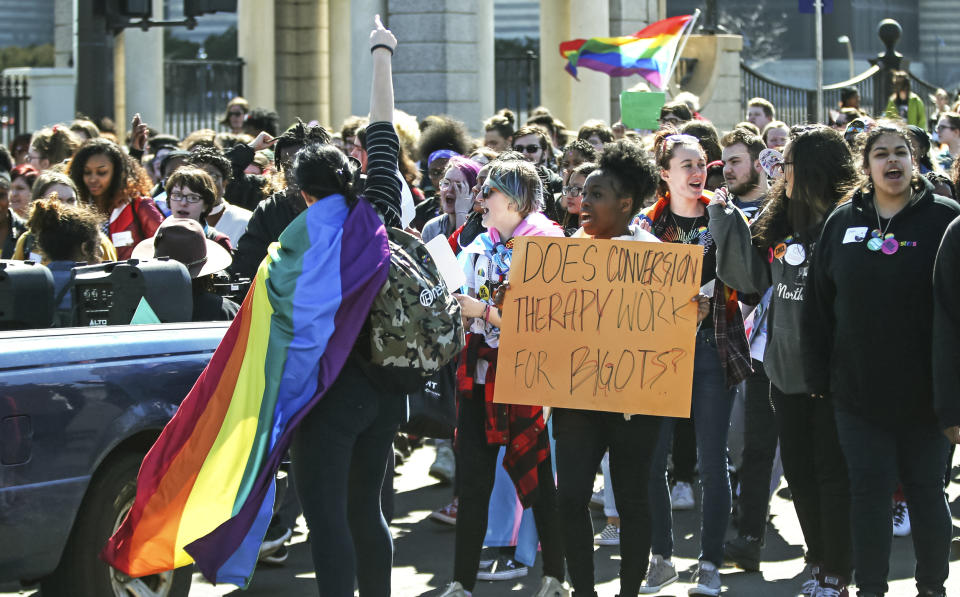Conversion therapy costs U.S. over $9 billion a year, study finds
Multiple recent studies have concluded that conversion therapy harms the mental health of those subjected to it, but a report published Monday is the first to quantify the economic cost of the discredited practice.
Efforts to change LGBTQ people’s sexual orientation and gender identities cost the U.S. an estimated $9.23 billion each year, according to a peer-reviewed study in the journal JAMA Pediatrics. Casey Pick, a senior fellow for advocacy and government affairs for The Trevor Project, which conducted the research in partnership with the multinational clinical trial organization Cytel, said the estimate is “conservative.”
“We knew that there was a financial component to this,” Pick said. “We’re hopeful that for policymakers and others, really being able to look into what that kind of cost looks like would be another way to emphasize just how harmful and detrimental to society this practice really is.”
Related video: Inside the effort to ban conversion therapy
Coming up with the estimate was an intensive, yearlong process, Pick said. The Trevor Project, a national crisis intervention and suicide prevention organization, worked with a team of economists to develop a model that would examine both the direct costs of conversion therapy and the ongoing costs of mental health and other kinds of medical treatment for survivors of the practice, which entails talk therapy to, in rare cases, shock treatment and water torture.
Research published by The Trevor Project in 2019 found that LGBTQ young people who had been subjected to conversion therapy were more likely to have attempted suicide in the previous 12 months than other queer youths. Happier, healthier people have “less need of treatment or, particularly, trips to the emergency room in the event of suicide attempts,” Pick said.
“They experience less depression and less anxiety and, therefore, require less treatment for that,” she added.
While the $9.23 billion figure attempts to factor in intangible costs, like lost productivity to businesses from survivors’ dealing with mental health struggles, many of the costs that are factored in are direct. The Trevor Project estimates that $650 million is spent annually to provide for so-called conversion therapy, which is also referred to as “reparative therapy” or “ex-gay therapy.”

Twenty-five states already fully or partly ban conversion therapy for minors, according to the LGBTQ think tank Movement Advancement Project, and Pick said The Trevor Project hopes the new report will fuel the group’s longtime efforts for a federal ban.
The nonprofit organization is a proponent of the Prohibition of Medicaid Funding for Conversion Therapy Act, which would ban the use of taxpayer money under Medicaid to pay for a practice that nearly every leading U.S. medical association has condemned. The legislation, which was introduced in 2019 by Rep. Sean Patrick Maloney, D-N.Y., has yet to pass either the House or the Senate; Amit Paley, The Trevor Project’s executive director and CEO, said he hopes the report motivates Congress to act.
“This alarming study illustrates that subjecting LGBTQ young people to conversion therapy continues to have deep and detrimental costs from both a humanistic and economic standpoint,” Paley said in a statement. “The Trevor Project urges policymakers to protect LGBTQ youth from the dangers of this so-called ‘therapy’ and to also expand access to LGBTQ-affirming therapy as a means to empower young people to accept themselves for who they are and promote positive health outcomes.”
Opponents of banning conversion therapy commonly cite religious objections, claiming that legislation to curtail the practice would constrain the free speech of faith leaders opposed to LGBTQ rights and the right of parents to determine medical treatment for their kids.
A 2018 report from the Williams Institute at UCLA estimated that nearly 700,000 LGBTQ adults were subjected to conversion therapy at some point in their lives and that about half of them were adolescents at the time of treatment. In 2019, the institute estimated that state bans prevented an additional 10,000 teens from being subjected to the practice.
Pick said she hopes The Trevor Project’s research not only persuades lawmakers across the U.S. to ban conversion therapy but also underscores the harms of denying appropriate health care to LGBTQ youths. So far this year, at least 28 bills have been introduced across the U.S. to limit access to gender-affirming treatments like puberty blockers for trans youths, according to the Human Rights Campaign, while Texas Gov. Greg Abbott recently declared gender-affirming care for minors to be “child abuse.”
“The evidence that we present here of the tremendous benefit to society of removing barriers to affirming health care sends a powerful message as we try to defend against those who would instead construct new barriers,” Pick said.
By laying out the economic impact of conversion therapy, Pick hopes politicians across the country will listen to young people and better understand their “pain and negative experiences.”
“I firmly believe that lawmakers of all political persuasions can be influenced and can come to understand the harms of these practices if they take the time to look into it and to see the stories behind the dollars and cents that we’re describing here,” she said.


